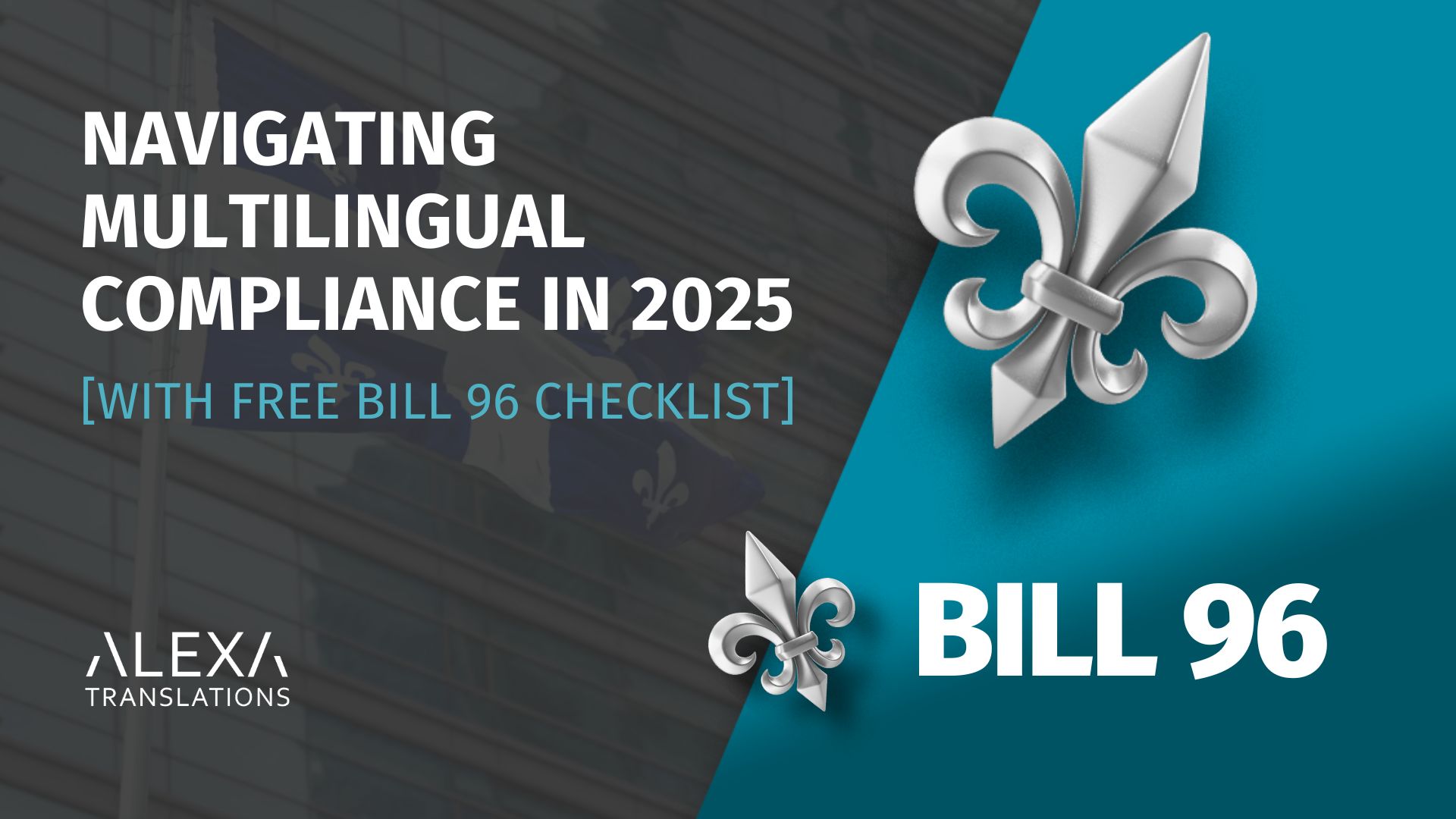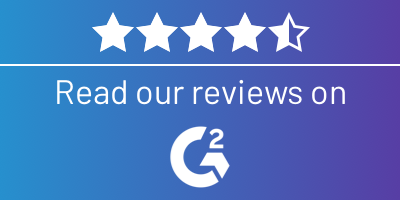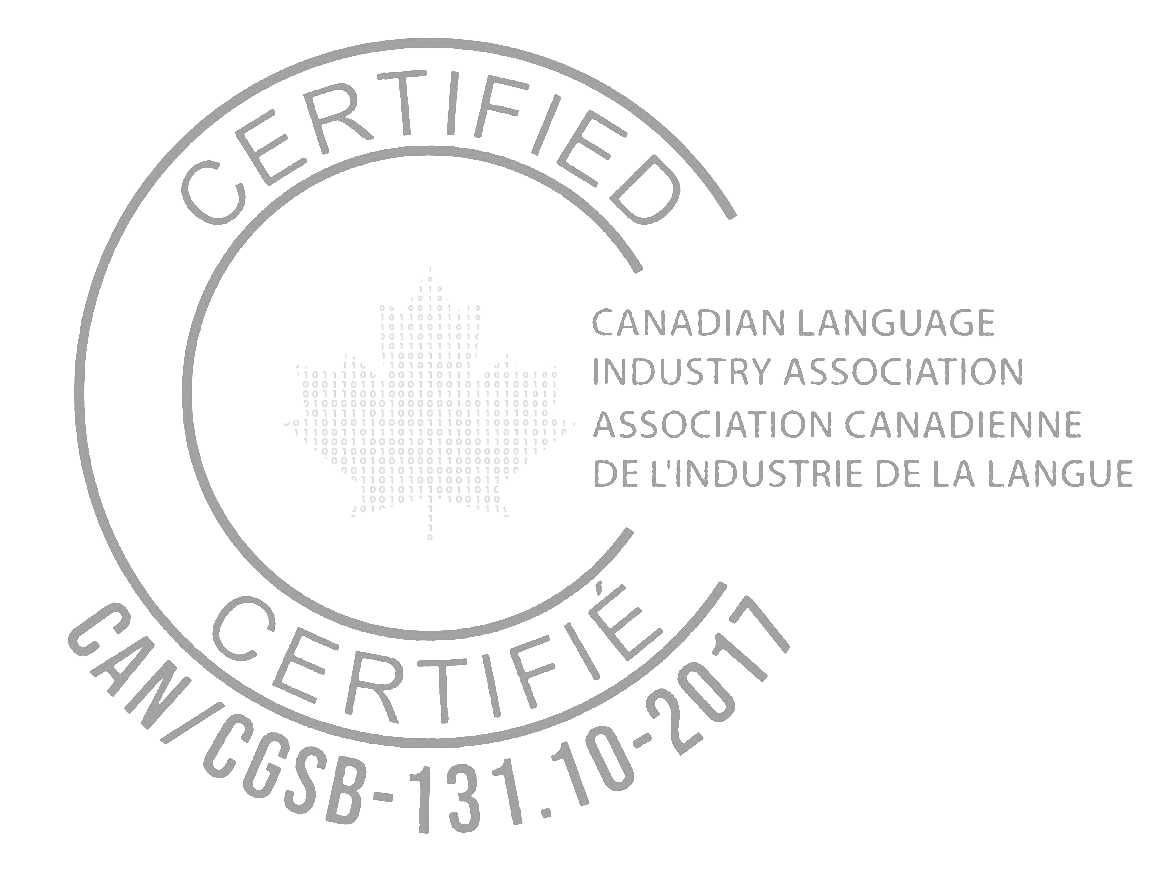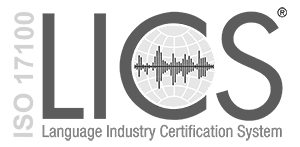Are you ready to pay your $30,000 fine? How about a $60,000 fine? Or maybe you're ready for a $120,000 fine. That is the risk you face if you're non-compliant in Québec. Your first fine can be as high as $30,000—and they can double for each subsequent offence.
In an interconnected world, regulatory compliance has become more critical and complex than ever. For organizations operating in bilingual or multilingual jurisdictions, such as Canada, adhering to language laws is not just about meeting requirements, it’s about building trust, accessing markets and fostering inclusivity.
Now as the changes approach, businesses must navigate evolving language compliance regulations, particularly in Québec and across Canada, while leveraging technology and best practices to remain competitive. This blog explores the latest regulatory updates, offers actionable strategies and highlights how advanced tools can simplify the compliance journey.
- Why Multilingual Compliance is Non-Negotiable
- Key Regulatory Updates for 2025
- Federal Alignment with the Official Languages Act
- Industry-Specific Mandates
- Strategies for Multilingual Compliance in 2025
- Leveraging Alexa Translations for Compliance Success
- Key Takeaways
- Future-Proof Your Compliance Strategy
- FAQ for Bill 96
Why Multilingual Compliance is Non-Negotiable
Organizations face several pressures driving the need for robust compliance with language laws:
- Regulatory Frameworks: Laws like Québec’s Bill 96 and Canada’s Official Languages Act require businesses to provide communications in both English and French. Non-compliance risks fines, legal challenges and reputational damage.
- Enhanced Market Access: Proper compliance is essential for entering and thriving in Canadian markets. It demonstrates respect for local cultures and laws, essential for consumer trust and long-term success.
- Evolving Consumer Expectations: According to a survey by the Office of the Commissioner of Official Languages, 87% of Canadians support the Official Languages Act, reflecting strong national endorsement for bilingualism. This reinforces the growing expectation for bilingual communication as a crucial factor in consumer engagement and business competitiveness. (Office of the Commissioner of Official Languages)
Key Regulatory Updates for 2025
Québec’s Bill 96: Strengthened Provisions
Québec’s Bill 96, enacted in 2022, continues to reshape language compliance obligations for businesses operating within the province. Several critical new provisions have come into force in 2025, significantly expanding the scope of mandatory French-language requirements across workplaces, product packaging, signage and advertising.
Reduction in Employee Threshold for French Language Requirements:
- Before June 2025, Bill 96 only impacted companies with more than 50 employees. However, after June, companies with as few as 25 employees will also be required to comply with French-language requirements in the workplace. The requirements will be to:
- Conduct all internal communications, including emails, memos and notices, in French.
- Provide employment-related documents (e.g., contracts, manuals, policies) in French.
- Ensure that training materials and workplace signage are available in French.
- Non-compliance may expose businesses to administrative penalties, reputational risks and challenges in labor relations. (Norton Rose Fullbright)
“Businesses will be required to comply with French-language signage, contract and trademark obligations as of June 1, 2025.” (Fasken, 2024)
Trademark Usage on Products:
- As of June 1, 2025, new restrictions will apply to trademarks and product labeling:
- Only registered trademarks may appear in a language other than French on product packaging.
- If a French version of a trademark is registered, it must be used exclusively.
- Any generic terms, product descriptions, or non-distinctive elements included within or near a non-French trademark must also be translated into French and displayed prominently.
- These rules aim to increase the visibility and use of French on consumer products. Non-compliant packaging may lead to enforcement actions or market withdrawal orders. (Fasken)
Public Signage and Advertising:
- Businesses must ensure that public signage, posters and commercial advertising give French marked predominance over any other language. While non-French registered trademarks may still be used, the surrounding content and overall presentation must prioritize French.
- Businesses must also comply with stricter language rules for signage and advertising:
- French must be markedly predominant over any other language on public signage, posters and commercial advertising.
- Although non-French registered trademarks may still be used, the overall presentation—including slogans, descriptors and supplementary text—must prioritize French in visibility, layout and design.
- Regulatory compliance will be assessed based on the overall impression conveyed to the public, not merely individual elements such as font size or position. (Gowling WLG)
Federal Alignment with the Official Languages Act
Canada’s Official Languages Act underwent significant modernization with the passage of Bill C-13 in 2023. While the legislative changes were enacted earlier, 2025 marks a critical phase in the operational rollout of enhanced compliance obligations and enforcement measures across industries.
Stronger Enforcement and Compliance Monitoring
- Beginning in 2025, federal institutions and regulated organizations will face increased scrutiny regarding their compliance with bilingual communication requirements. Key developments include:
- Expanded Oversight Powers: The Treasury Board has been formally tasked with coordinating official languages compliance across federal institutions, with enhanced powers to monitor, evaluate, and guide implementation. While the authority was established in 2023, active oversight and structured reporting mechanisms are being phased in throughout 2025.
- Enhanced Authority of the Commissioner of Official Languages: Bill C-13 also expanded the Commissioner’s powers, introducing compliance agreements and the ability to recommend administrative monetary penalties for persistent non-compliance. Practical use of these enforcement tools is expected to increase notably in 2025.
- Expanded Oversight Powers: The Treasury Board has been formally tasked with coordinating official languages compliance across federal institutions, with enhanced powers to monitor, evaluate, and guide implementation. While the authority was established in 2023, active oversight and structured reporting mechanisms are being phased in throughout 2025.
Support Initiatives for Small Businesses
- The Action Plan for Official Languages 2023–2028 includes initiatives aimed at supporting small and medium-sized businesses, particularly those operating in minority language communities. These programs, announced in 2023, are scaling their implementation through 2025, offering:
- Access to federal grants to enhance bilingual service delivery.
- Tailored resources to assist small organizations in meeting their language obligations cost-effectively. (Canada.ca)
Industry-Specific Mandates
Certain industries, such as legal and financial services, face stricter compliance standards in 2025:
- Legal Sector: Law firms offering federally regulated services or operating in designated bilingual regions must ensure that client communications, case files, contracts, and court submissions are available in both English and French where required. Auditing and enforcement measures are expected to become more rigorous beginning in 2025.
- Financial Sector: Federally regulated financial institutions—including banks, investment firms, and insurers—must maintain bilingual service delivery standards. Regulatory authorities are placing greater emphasis on transparency and client rights in both official languages, with stronger compliance verification measures coming into force.
Organizations operating within these sectors must proactively align their internal processes, training, and client interactions to meet evolving federal compliance expectations.
Strategies for Multilingual Compliance in 2025
- Centralize Translation Management Centralized translation systems improve consistency and compliance. By consolidating resources, businesses can eliminate inefficiencies and maintain uniformity across all communications.
- Leverage Technology for Efficiency: Advanced A.I.-powered platforms, such as Alexa Translations, streamline compliance processes. These solutions:
- Handle large-scale document translation with unparalleled speed and accuracy.
- Incorporate Translation Memory (TM) to ensure consistency across projects.
- Offer security certifications, such as SOC 2, to protect sensitive data.
- Tailor Solutions to Industry Needs: Compliance requirements differ by industry. A tailored approach ensures adherence to specific mandates, such as using precise legal or financial terminology.
- Invest in Employee Training: Equip your team with the tools and knowledge to meet compliance standards. This includes training on language laws, internal processes and the effective use of translation technology.
Leveraging Alexa Translations for Compliance Success
Alexa Translations offers a comprehensive suite of tools and services tailored to businesses operating in bilingual environments:
- A.I.-Powered Translation: Combines machine efficiency with human expertise to deliver accurate and timely translations.
- Secure Platform: SOC 2-certified to ensure the protection of sensitive documents.
- Industry Specialization: Expertise in legal, financial and government compliance ensures adherence to regulatory frameworks.
Key Takeaways
- Stay Ahead of Regulatory Changes: Monitor updates to language laws and ensure internal processes align with evolving standards.
- Leverage Technology: Advanced translation platforms streamline compliance and improve efficiency.
- Build Trusted Partnerships: Partner with language service providers that understand your industry’s compliance needs.
Future-Proof Your Compliance Strategy
Multilingual compliance is not merely a legal requirement; it’s a strategic imperative in today’s global marketplace. As we navigate 2025, organizations must proactively adapt to regulatory changes, leverage cutting-edge technology and foster a culture of compliance.
Take the first step toward simplifying compliance. Contact Alexa Translations today and discover how our tailored solutions can help your business thrive in a multilingual world.
FAQ for Bill 96
1. What major Bill 96 compliance requirements came into effect in 2025?
As of June 1, 2025, several critical provisions of Bill 96 are now in force. Most notably, any business operating in Québec with 25 or more employees is now required to meet enhanced French-language compliance standards. This includes providing internal documentation, such as contracts, HR policies, onboarding materials, and workplace communications in French. The reduced threshold expands the law’s applicability to many mid-sized companies that were previously exempt, triggering the need for formal francization planning and documentation updates.
2. What are the new requirements for trademarks and product labeling under Bill 96?
As of June 1, 2025:
- Registered Trademarks: Only trademarks registered in Canada without a French equivalent may appear exclusively in another language on product packaging.
- Descriptive Terms: Any generic terms or product descriptions displayed near or within a non-French trademark must now appear prominently in French.
These measures aim to enhance the visibility and use of French on consumer products in Québec. Non-compliant packaging is subject to regulatory penalties or removal from the Québec market.
3. What are the legal risks of non-compliance?
Non-compliance may result in:
- Administrative Penalties: Fines ranging from $3,000 to $30,000 for businesses, with amounts doubling for repeat offenses.
- Contract Nullification: Contracts not properly presented in French may be deemed null and void.
- Regulatory Delays: Delays or rejections in regulatory filings or business permits.
- Reputational Damage: Negative public perception and potential loss of consumer trust.
These risks underscore the importance of proactive compliance measures.
4. How can this checklist help my team prepare?
The checklist provides a structured overview of obligations from 2022 through 2025. It helps compliance teams audit existing materials, anticipate critical enforcement deadlines, and implement scalable bilingual policies, ensuring operational readiness while reducing legal and reputational risk.
However, please note that this checklist is provided for informational purposes only and does not constitute legal advice. Organizations should consult qualified legal counsel to assess their specific obligations under Bill 96 and related regulations.
5. How can I stay up to date with Bill 96 and other legal language compliance updates?
The legal landscape in Québec, particularly around language law, privacy, and regulatory enforcement, is evolving quickly. To stay informed, we recommend subscribing to our Newsletter, where we share regulatory updates, practical checklists, and expert analysis tailored for legal and compliance professionals in Canada.














